Thomas James Richards, Diaries, Transcript Vol. 2 - Part 18
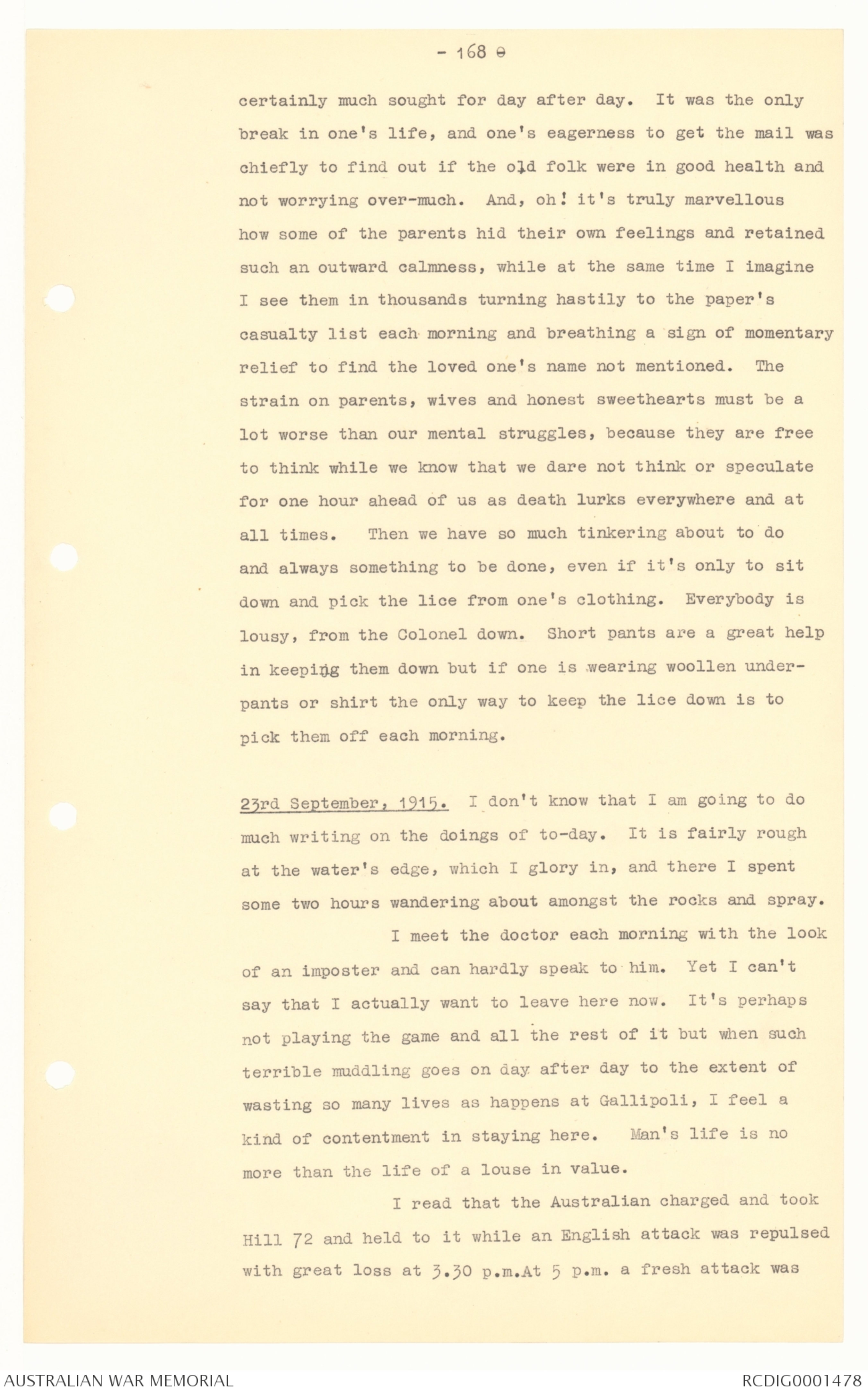
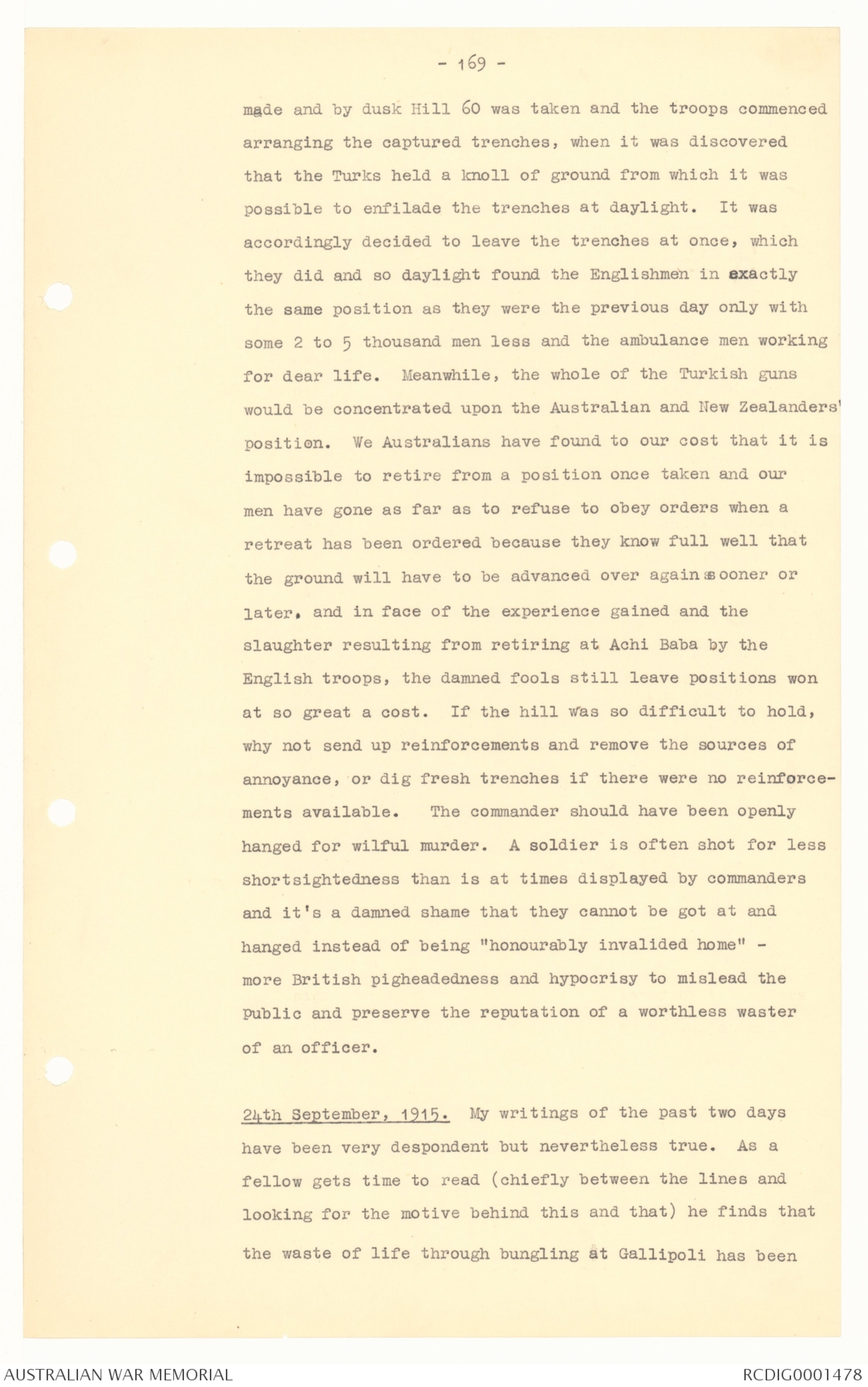
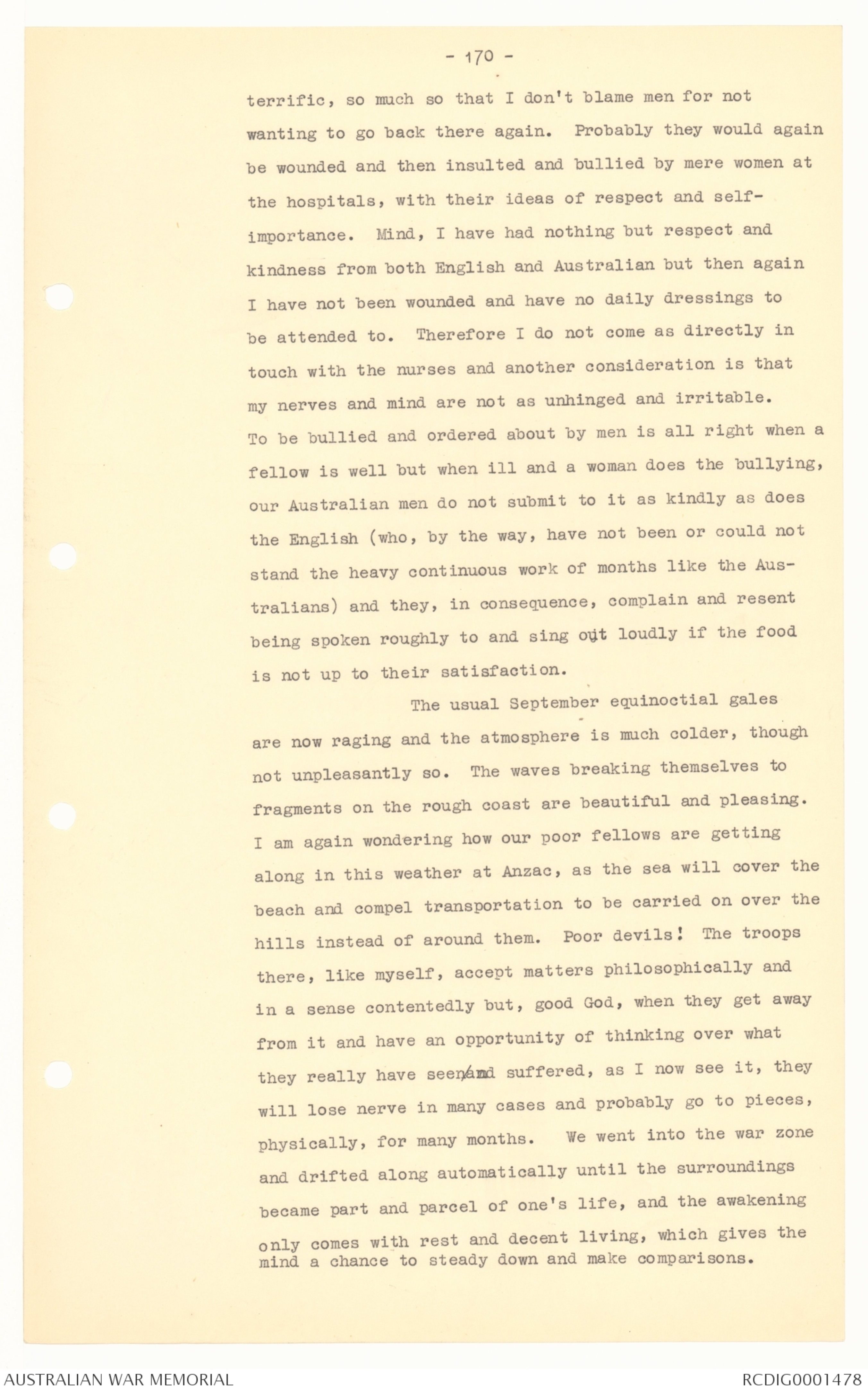
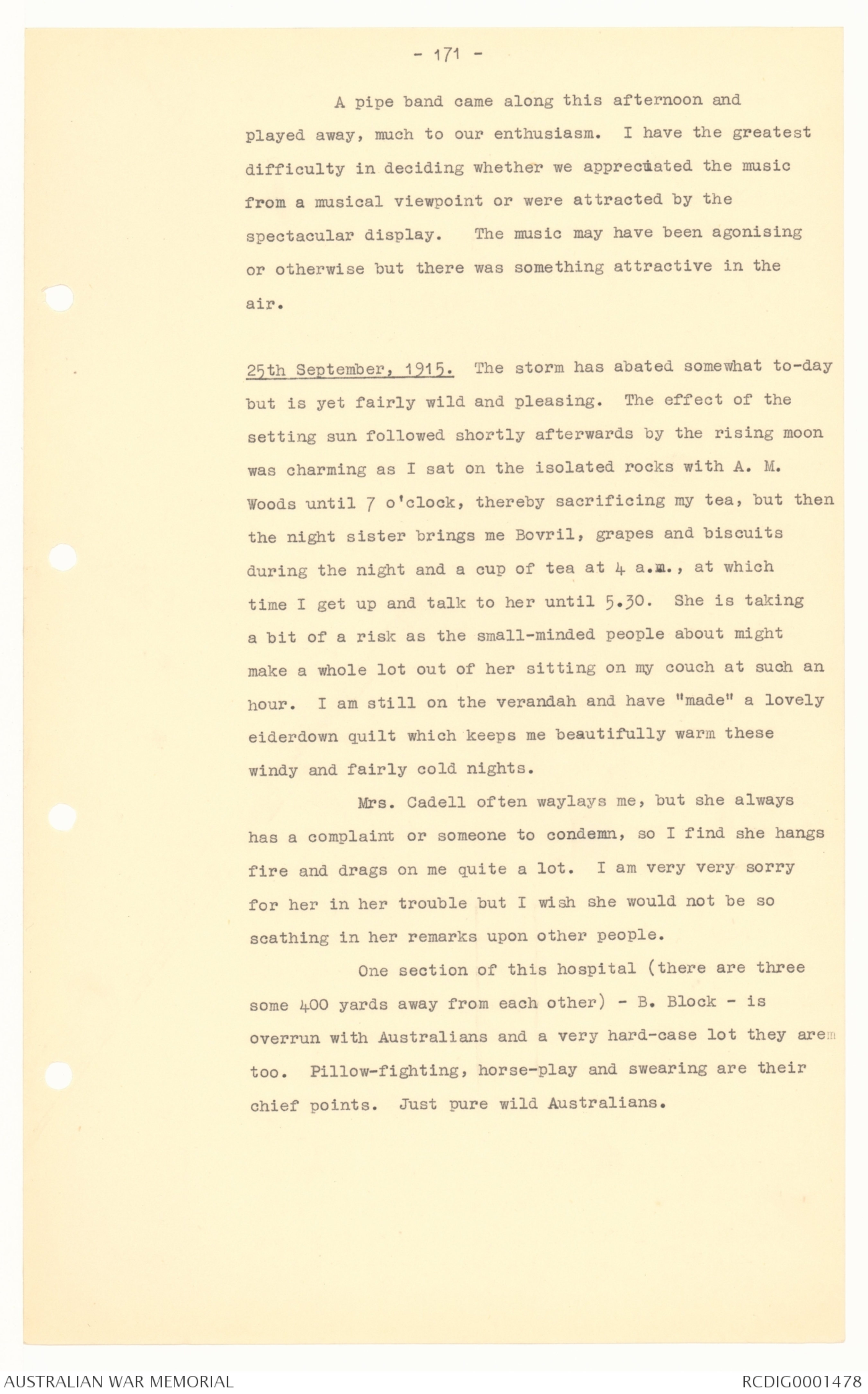
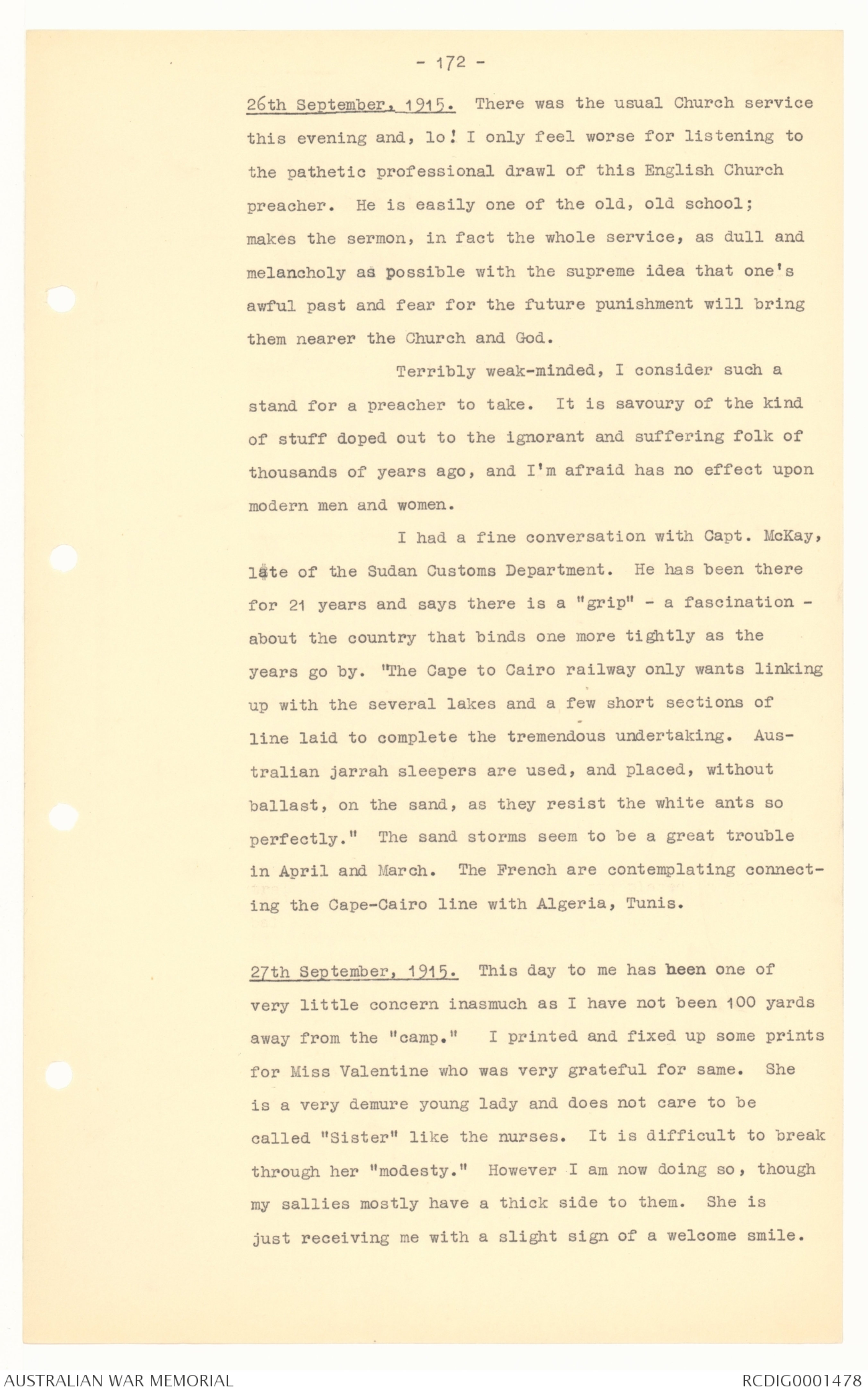
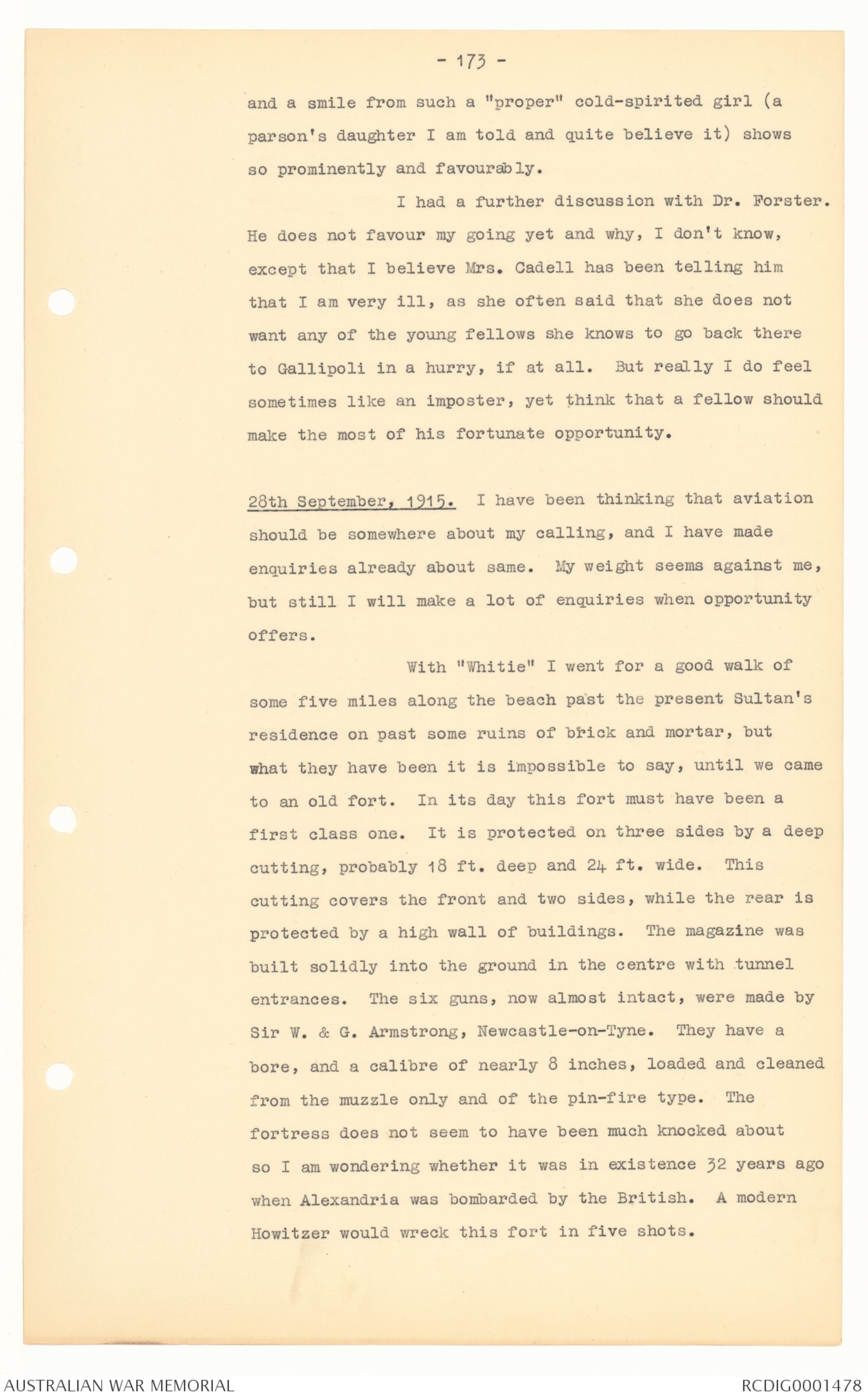
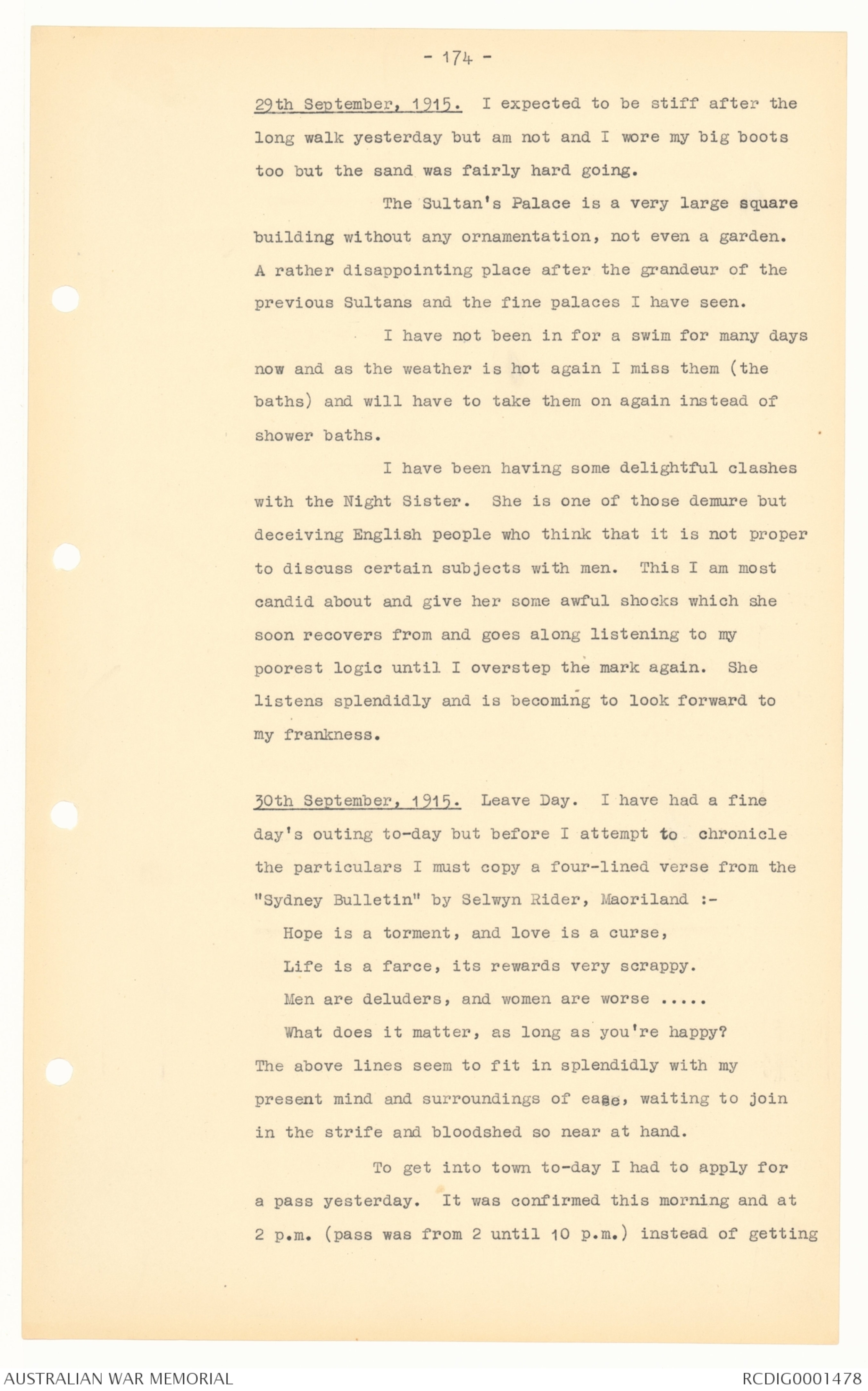
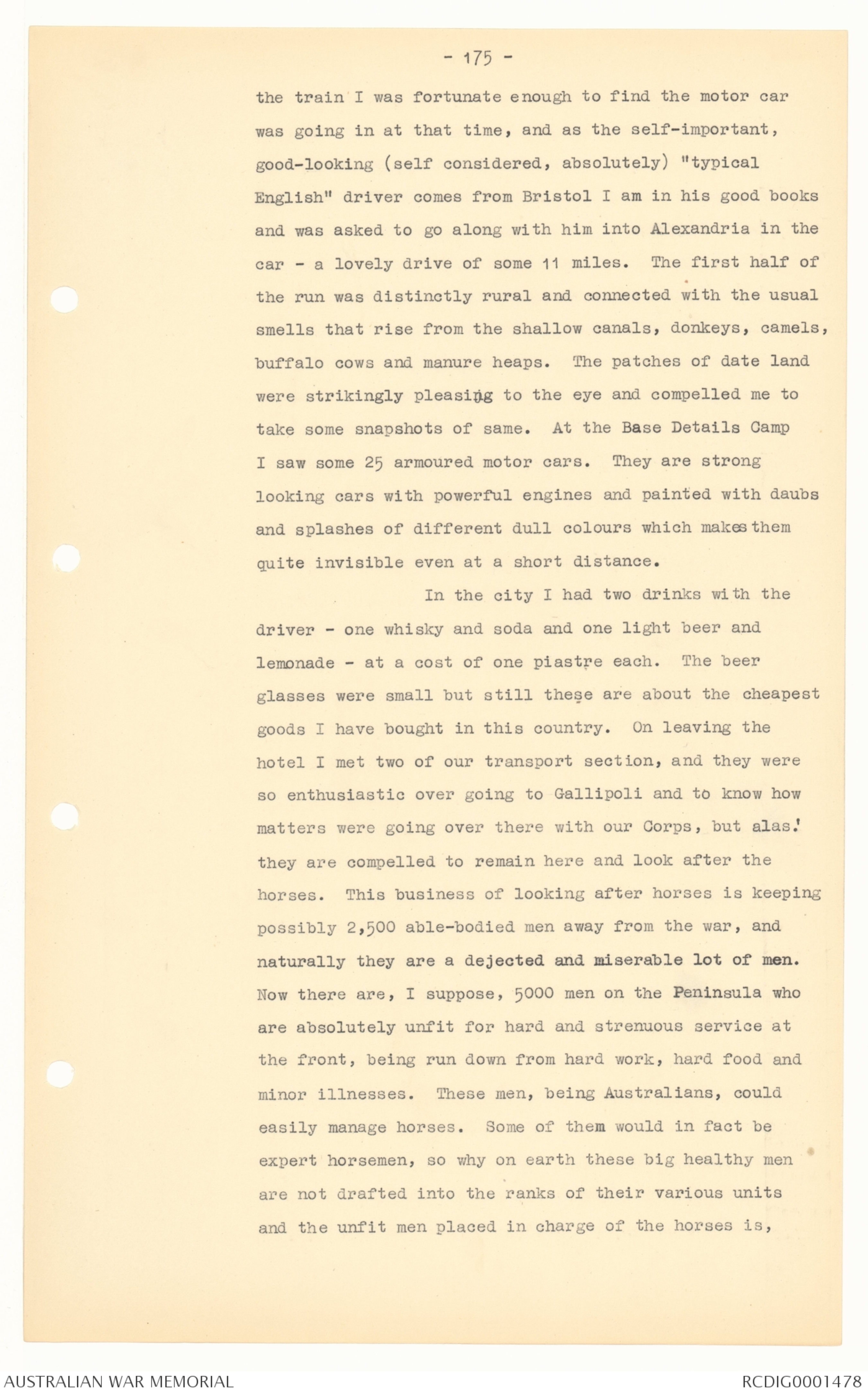
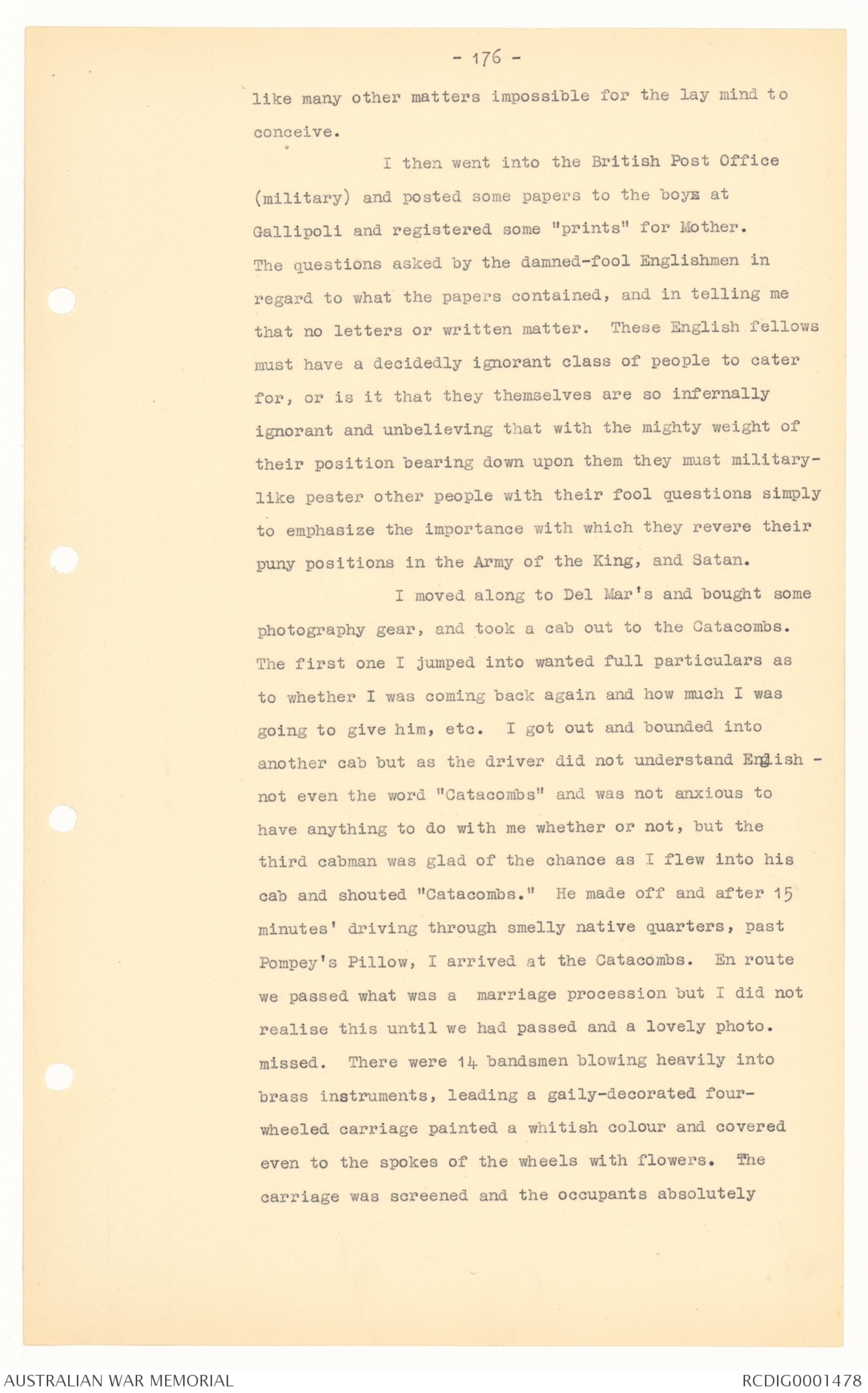
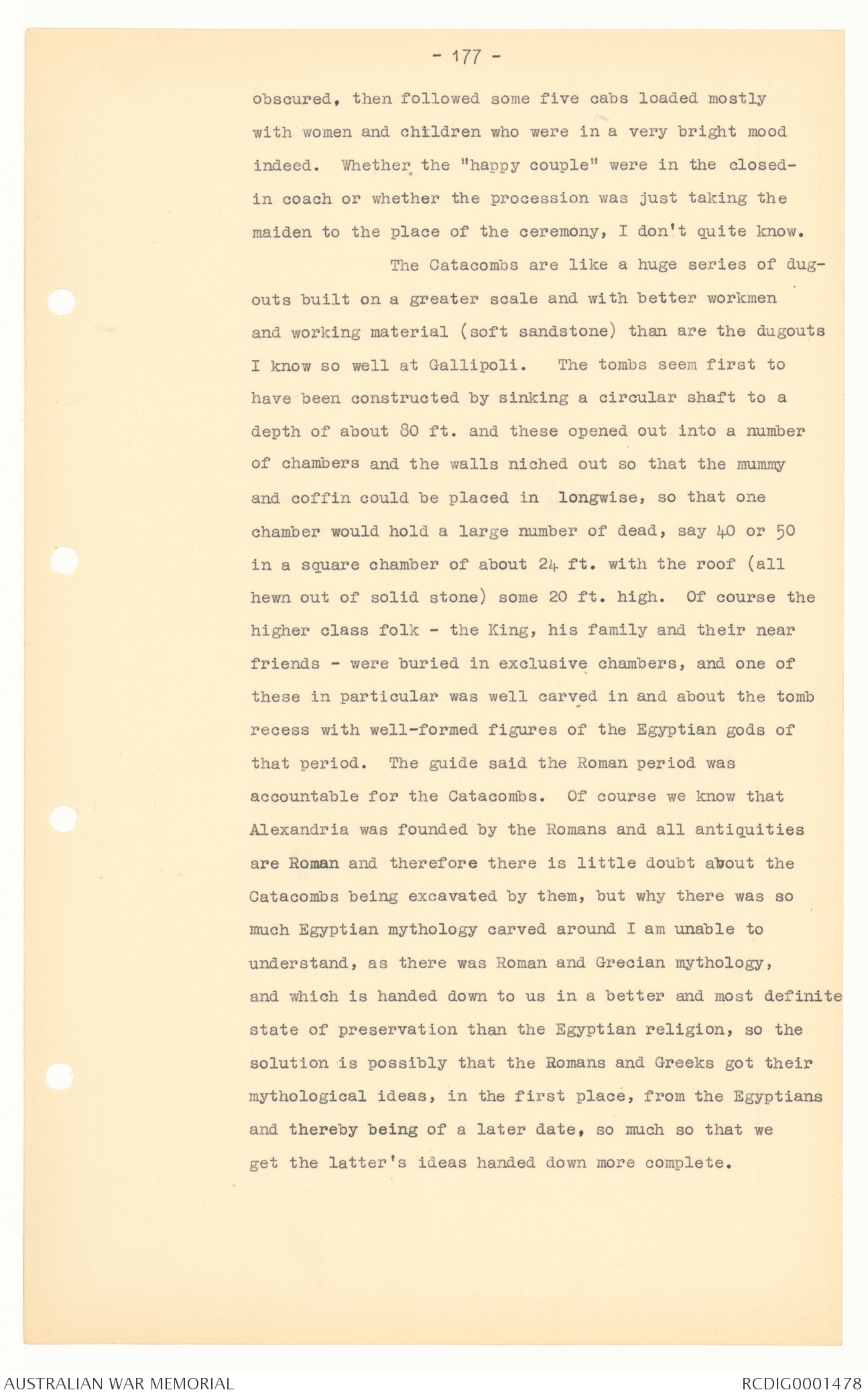
- 168 -
certainly much sought for day after day. It was the only
break in one's life, and one's eagerness to get the mail was
chiefly to find out if the old folk were in good health and
not worrying over-much. And, oh! it's truly marvellous
how some of the parents hid their own feelings and retained
such an outward calmness, while at the same time I imagine
I see them in thousands turning hastily to the paper's
casualty list each morning and breathing a sign of momentary
relief to find the loved one's name not mentioned. The
strain on parents, wives and honest sweethearts must be a
lot worse than our mental struggles, because they are free
to think while we know that we dare not think or speculate
for one hour ahead of us as death lurks everywhere and at
all times. Then we have so much tinkering about to do
and always something to be done, even if it's only to sit
down and pick the lice from one's clothing. Everybody is
lousy, from the Colonel down. Short pants are a great help
in keeping them down but if one is wearing woollen underpants
or shirt the only way to keep the lice down is to
pick them off each morning.
23rd September, 1915. I don't know that I am going to do
much writing on the doings of to-day. It is fairly rough
at the water's edge, which I glory in, and there I spent
some two hours wandering about amongst the rocks and spray.
I meet the doctor each morning with the look
of an imposter and can hardly speak to him. Yet I can't
say that I actually want to leave here now. It's perhaps
not playing the game and all the rest of it but when such
terrible muddling goes on day after day to the extent of
wasting so many lives as happens at Gallipoli, I feel a
kind of contentment in staying here. Man's life is no
more than the life of a louse in value.
I read that the Australian charged and took
Hill 72 and held to it while an English attack was repulsed
with great loss at 3.30 p.m.At 5 p.m. a fresh attack was
- 169 -
made and by dusk Hill 60 was taken and the troops commenced
arranging the captured trenches, when it was discovered
that the Turks held a knoll of ground from which it was
possible to enfilade the trenches at daylight. It was
accordingly decided to leave the trenches at once, which
they did and so daylight found the Englishmen in exactly
the same position as they were the previous day only with
some 2 to 5 thousand men less and the ambulance men working
for dear life. Meanwhile, the whole of the Turkish guns
would be concentrated upon the Australian and New Zealanders'
position. We Australians have found to our cost that it is
impossible to retire from a position once taken and our
men have gone as far as to refuse to obey orders when a
retreat has been ordered because they know full well that
the ground will have to be advanced over again sooner or
later, and in face of the experience gained and the
slaughter resulting from retiring at Achi Baba by the
English troops, the damned fools still leave positions won
at so great a cost. If the hill was so difficult to hold,
why not send up reinforcements and remove the sources of
annoyance, or dig fresh trenches if there were no reinforcements
available. The commander should have been openly
hanged for wilful murder. A soldier is often shot for less
shortsightedness than is at times displayed by commanders
and it's a damned shame that they cannot be got at and
hanged instead of being "honourably invalided home" -
more British pigheadedness and hypocrisy to mislead the
public and preserve the reputation of a worthless waster
of an officer.
24th September, 1915. My writings of the past two days
have been very despondent but nevertheless true. As a
fellow gets time to read (chiefly between the lines and
looking for the motive behind this and that) he finds that
the waste of life through bungling at Gallipoli has been
- 170 -
terrific, so much so that I don’t blame men for not
wanting to go back there again. Probably they would again
be wounded and then insulted and bullied by mere women at
the hospitals, with their ideas of respect and self-importance.
Mind, I have had nothing but respect and
kindness from both English and Australian but then again
I have not been wounded and have no daily dressings to
be attended to. Therefore I do not come as directly in
touch with the nurses and another consideration is that
my nerves and mind are not as unhinged and irritable.
To be bullied and ordered about by men is all right when a
fellow is well but when ill and a woman does the bullying,
our Australian men do not submit to it as kindly as does
the English (who, by the way, have not been or could not
stand the heavy continuous work of months like the Australians)
and they, in consequence, complain and resent
being spoken roughly to and sing out loudly if the food
is not up to their satisfaction.
The usual September equinoctial gales
are now raging and the atmosphere is much colder, though
not unpleasantly so. The waves breaking themselves to
fragments on the rough coast are beautiful and pleasing.
I am again wondering how our poor fellows are getting
along in this weather at Anzac, as the sea will cover the
beach and compel transportation to be carried on over the
hills instead of around them. Poor devils! The troops
there, like myself, accept matters philosophically and
in a sense contentedly but, good God, when they get away
from it and have an opportunity of thinking over what
they really have seen/and suffered, as I now see it, they
will lose nerve in many cases and probably go to pieces,
physically, for many months. We went into the war zone
and drifted along automatically until the surroundings
became part and parcel of one's life, and the awakening
only comes with rest and decent living, which gives the
mind a chance to steady down and make comparisons.
- 171 -
A pipe band came along this afternoon and
played away, much to our enthusiasm. I have the greatest
difficulty in deciding whether we appreciated the music
from a musical viewpoint or were attracted by the
spectacular display. The music may have been agonising
or otherwise but there was something attractive in the
air.
25th September, 1915. The storm has abated somewhat to-day
but is yet fairly wild and pleasing. The effect of the
setting sun followed shortly afterwards by the rising moon
was charming as I sat on the isolated rocks with A. M.
Woods until 7 o'clock, thereby sacrificing my tea, but then
the night sister brings me Bovril, grapes and biscuits
during the night and a cup of tea at 4 a.m., at which
time I get up and talk to her until 5.30. She is taking
a bit of a risk as the small-minded people about might
make a whole lot out of her sitting on my couch at such an
hour. I am still on the verandah and have "made" a lovely
eiderdown quilt which keeps me beautifully warm these
windy and fairly cold nights.
Mrs. Cadell often waylays me, but she always
has a complaint or someone to condemn, so I find she hangs
fire and drags on me quite a lot. I am very very sorry
for her in her trouble but I wish she would not be so
scathing in her remarks upon other people.
One section of this hospital (there are three
some 400 yards away from each other) - B. Block - is
overrun with Australians and a very hard-case lot they are
too. Pillow-fighting, horse-play and swearing are their
chief points. Just pure wild Australians.
- 172 -
26th September, 1915. There was the usual Church service
this evening and, lo! I only feel worse for listening to
the pathetic professional drawl of this English Church
preacher. He is easily one of the old, old school;
makes the sermon, in fact the whole service, as dull and
melancholy as possible with the supreme idea that one's
awful past and fear for the future punishment will bring
them nearer the Church and God.
Terribly weak-minded, I consider such a
stand for a preacher to take. It is savoury of the kind
of stuff doped out to the ignorant and suffering folk of
thousands of years ago, and I'm afraid has no effect upon
modern men and women.
I had a fine conversation with Capt. McKay,
late of the Sudan Customs Department. He has been there
for 21 years and says there is a "grip" - a fascination -
about the country that binds one more tightly as the
years go by. "The Cape to Cairo railway only wants linking
up with the several lakes and a few short sections of
line laid to complete the tremendous undertaking. Australian
jarrah sleepers are used, and placed, without
ballast, on the sand, as they resist the white ants so
perfectly." The sand storms seem to be a great trouble
in April and March. The French are contemplating connecting
the Cape-Cairo line with Algeria, Tunis.
27th September, 1915. This day to me has been one of
very little concern inasmuch as I have not been 100 yards
away from the "camp." I printed and fixed up some prints
for Miss Valentine who was very grateful for same. She
is a very demure young lady and does not care to be
called "Sister" like the nurses. It is difficult to break
through her "modesty." However I am now doing so, though
my sallies mostly have a thick side to them. She is
just receiving me with a slight sign of a welcome smile.
- 173 -
and a smile from such a "proper" cold-spirited girl (a
parson's daughter I am told and quite believe it) shows
so prominently and favourably.
I had a further discussion with Dr. Forster.
He does not favour my going yet and why, I don’t know,
except that I believe Mrs. Cadell has been telling him
that I am very ill, as she often said that she does not
want any of the young fellows she knows to go back there
to Gallipoli in a hurry, if at all. But really I do feel
sometimes like an imposter, yet think that a fellow should
make the most of his fortunate opportunity.
28th September, 1915. I have been thinking that aviation
should be somewhere about my calling, and I have made
enquiries already about same. My weight seems against me,
but still I will make a lot of enquiries when opportunity
offers.
With "Whitie" I went for a good walk of
some five miles along the beach past the present Sultan's
residence on past some ruins of brick and mortar, but
what they have been it is impossible to say, until we came
to an old fort. In its day this fort must have been a
first class one. It is protected on three sides by a deep
cutting, probably 18 ft. deep and 24 ft. wide. This
cutting covers the front and two sides, while the rear is
protected by a high wall of buildings. The magazine was
built solidly into the ground in the centre with tunnel
entrances. The six guns, now almost intact, were made by
Sir W. & G. Armstrong, Newcastle-on-Tyne. They have a
bore, and a calibre of nearly 8 inches, loaded and cleaned
from the muzzle only and of the pin-fire type. The
fortress does not seem to have been much knocked about
so I am wondering whether it was in existence 32 years ago
when Alexandria was bombarded by the British. A modern
Howitzer would wreck this fort in five shots.
- 174 -
29th September, 1915. I expected to be stiff after the
long walk yesterday but am not and I wore my big boots
too but the sand was fairly hard going.
The Sultan's Palace is a very large square
building without any ornamentation, not even a garden.
A rather disappointing place after the grandeur of the
previous Sultans and the fine palaces I have seen.
I have not been in for a swim for many days
now and as the weather is hot again I miss them (the
baths) and will have to take them on again instead of
shower baths.
I have been having some delightful clashes
with the Night Sister. She is one of those demure but
deceiving English people who think that it is not proper
to discuss certain subjects with men. This I am most
candid about and give her some awful shocks which she
soon recovers from and goes along listening to my
poorest logic until I overstep the mark again. She
listens splendidly and is becoming to look forward to
my frankness.
30th September,1915. Leave Day. I have had a fine
day's outing to-day but before I attempt to chronicle
the particulars I must copy a four-lined verse from the
"Sydney Bulletin" by Selwyn Rider, Maoriland :-
Hope is a torment, and love is a curse,
Life is a farce, its rewards very scrappy.
Men are deluders, and women are worse . . . .
What does it matter, as long as you're happy?
The above lines seem to fit in splendidly with my
present mind and surroundings of ease, waiting to join
in the strife and bloodshed so near at hand.
To get into town to-day I had to apply for
a pass yesterday. It was confirmed this morning and at
2 p.m. (pass was from 2 until 10 p.m.) instead of getting
- 175 -
the train I was fortunate enough to find the motor car
was going in at that time, and as the self-important,
good-looking (self considered, absolutely) "typical
English" driver comes from Bristol I am in his good books
and was asked to go along with him into Alexandria in the
car - a lovely drive of some 11 miles. The first half of
the run was distinctly rural and connected with the usual
smells that rise from the shallow canals, donkeys, camels,
buffalo cows and manure heaps. The patches of date land
were strikingly pleasing to the eye and compelled me to
take some snapshots of same. At the Base Details Camp
I saw some 25 armoured motor cars. They are strong
looking cars with powerful engines and painted with daubs
and splashes of different dull colours which makes them
quite invisible even at a short distance.
In the city I had two drinks with the
driver - one whisky and soda and one light beer and
lemonade - at a cost of one piastre each. The beer
glasses were small but still these are about the cheapest
goods I have bought in this country. On leaving the
hotel I met two of our transport section, and they were
so enthusiastic over going to Gallipoli and to know how
matters were going over there with our Corps, but alas!
they are compelled to remain here and look after the
horses. This business of looking after horses is keeping
possibly 2,500 able-bodied men away from the war, and
naturally they are a dejected and miserable lot of men.
Now there are, I suppose, 5000 men on the Peninsula who
are absolutely unfit for hard and strenuous service at
the front, being run down from hard work, hard food and
minor illnesses. These men, being Australians, could
easily manage horses. Some of them would in fact be
expert horsemen, so why on earth these big healthy men
are not drafted into the ranks of their various units
and the unfit men placed in charge of the horses is,
- 176 -
like many other matters impossible for the lay mind to
conceive.
I then went into the British Post Office
(military) and posted some papers to the boys at
Gallipoli and registered some "prints" for Mother.
The questions asked by the damned-fool Englishmen in
regard to what the papers contained, and in telling me
that no letters or written matter. These English fellows
must have a decidedly ignorant class of people to cater
for, or is it that they themselves are so infernally
ignorant and unbelieving that with the mighty weight of
their position bearing down upon them they must military-like
pester other people with their fool questions simply
to emphasize the importance with which they revere their
puny positions in the Army of the King, and Satan.
I moved along to Del Mar's and bought some
photography gear, and took a cab out to the Catacombs.
The first one I jumped into wanted full particulars as
to whether I was coming back again and how much I was
going to give him, etc. I got out and bounded into
another cab but as the driver did not understand English
not even the word "Catacombs" and was not anxious to
have anything to do with me whether or not, but the
third cabman was glad of the chance as I flew into his
cab and shouted "Catacombs." He made off and after 15
minutes' driving through smelly native quarters, past
Pompey's Pillow, I arrived at the Catacombs. En route
we passed what was a marriage procession but I did not
realise this until we had passed and a lovely photo.
missed. There were 14 bandsmen blowing heavily into
brass instruments, leading a gaily-decorated four wheeled
carriage painted a whitish colour and covered
even to the spokes of the wheels with flowers. The
carriage was screened and the occupants absolutely
177 -
obscured, then followed some five cabs loaded mostly
with women and children who were in a very bright mood
indeed. Whether the "happy couple" were in the closed-
in coach or whether the procession was just taking the
maiden to the place of the ceremony, I don't quite know.
The Catacombs are like a huge series of dugouts
built on a greater scale and with better workmen
and working material (soft sandstone) than are the dugouts
I know so well at Gallipoli. The tombs seem first to
have been constructed by sinking a circular shaft to a
depth of about 80 ft. and these opened out into a number
of chambers and the walls niched out so that the mummy
and coffin could be placed in longwise, so that one
chamber would hold a large number of dead, say 40 or 50
in a square chamber of about 24 ft. with the roof (all
hewn out of solid stone) some 20 ft. high. Of course the
higher class folk - the King, his family and their near
friends - were buried in exclusive chambers, and one of
these in particular was well carved in and about the tomb
recess with well-formed figures of the Egyptian gods of
that period. The guide said the Roman period was
accountable for the Catacombs. Of course we know that
Alexandria was founded by the Romans and all antiquities
are Roman and therefore there is little doubt about the
Catacombs being excavated by them, but why there was so
much Egyptian mythology carved around I am unable to
understand, as there was Roman and Grecian mythology,
and which is handed down to us in a better and most definite
state of preservation than the Egyptian religion, so the
solution is possibly that the Romans and Greeks got their
mythological ideas, in the first place, from the Egyptians
and thereby being of a later date, so much so that we
get the latter's ideas handed down more complete.
 Loretta Corbett
Loretta CorbettThis transcription item is now locked to you for editing. To release the lock either Save your changes or Cancel.
This lock will be automatically released after 60 minutes of inactivity.